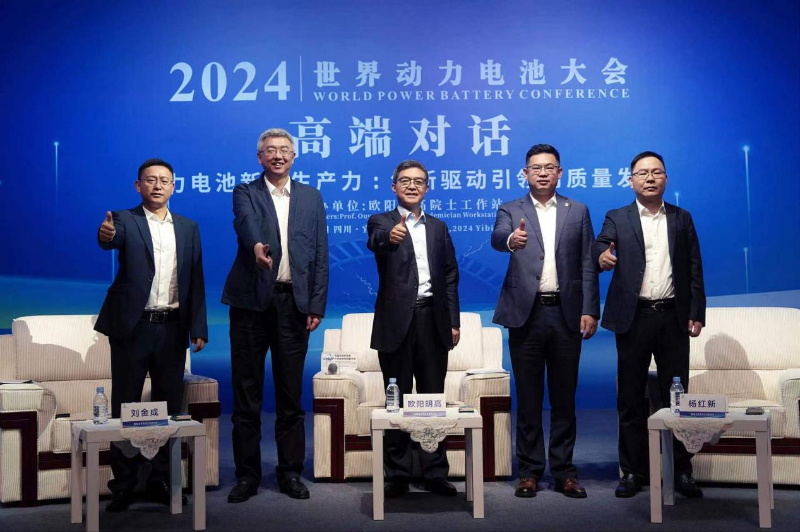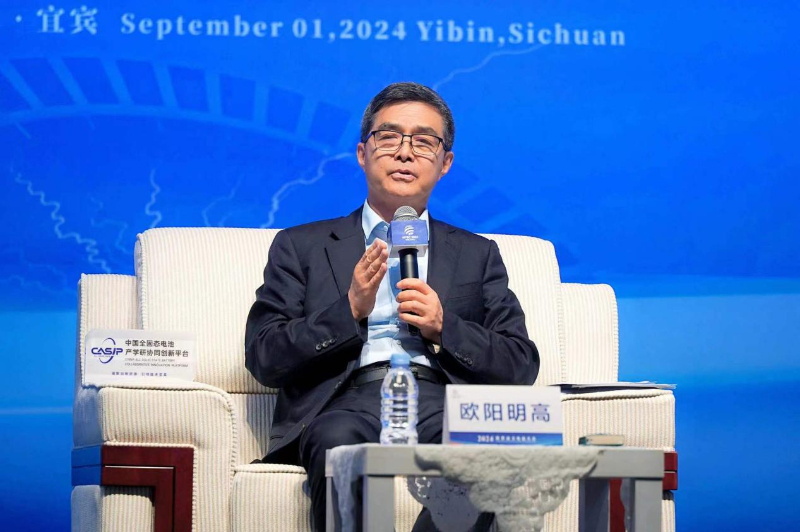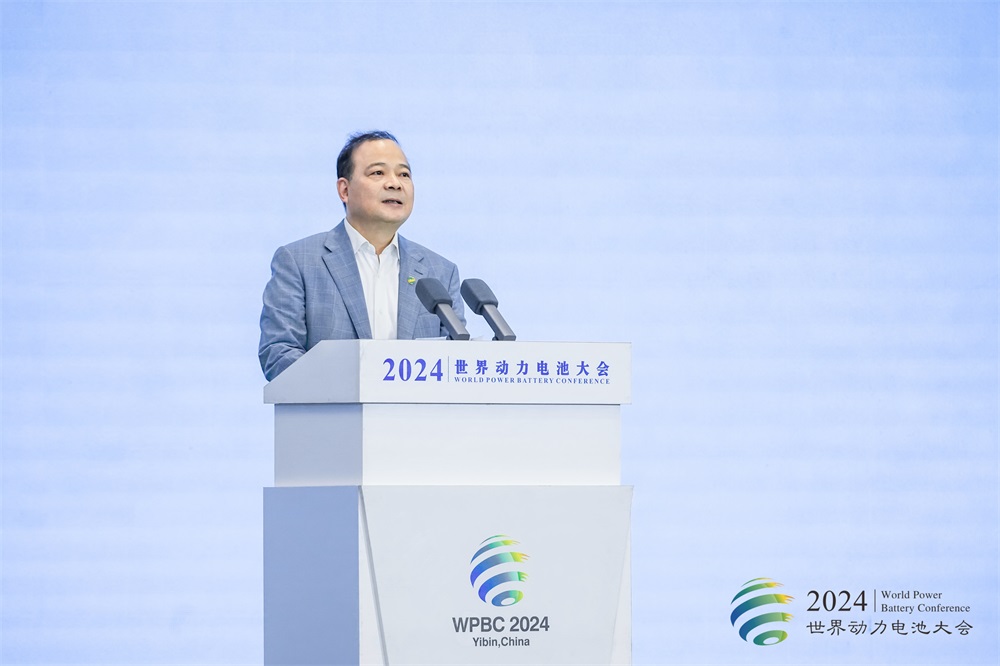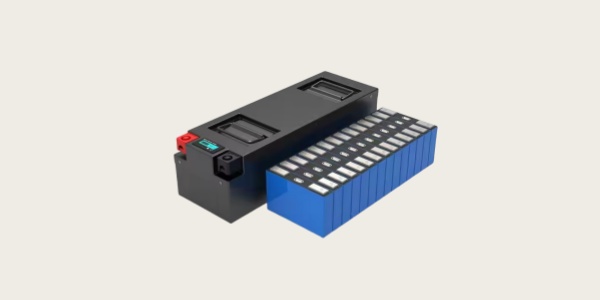Innovation drive leads the development of the 2024 World Power Battery Conference "New quality productivity" high-end dialogue

On September 1, the 2024 World Power Battery Congress was officially launched. As one of the important activities of the conference, the high-end dialogue of "New Quality Productivity" hosted by Academician Ouyang Minggao Workstation and co-organized by China all-solid-state Battery industry-university-research Collaborative Innovation Platform was held at the same time.
The high-end dialogue was chaired by Ouyang Minggao, academician of the Chinese Academy of Sciences and chairman of the China All-solid-state Battery Industry-University-Research Collaborative Innovation Platform. Leaders of battery companies participating in the dialogue include Liu Jincheng, chairman of Huizhou EVE Energy Co., LTD., Yang Hongxin, chairman and CEO of SVOLT Energy Technology Co., LTD., Meng Xiangfeng, vice president of CATL New Energy Technology Co., LTD., and Sun Huajun, CTO of Shenzhen BYD Lithium Battery Co., LTD.

Academician Ouyang Ming Gao and the guests discussed key topics such as "market application expansion and cost reduction space", "energy storage market and technology trends", "forward-looking technology development trend", and "green manufacturing and going to sea", and shared their views.
Market application field expansion and cost reduction space
Participants in this high-end dialogue believe that the current battery market application expansion opportunities are obvious, cost reduction and sustainable development, and technological innovation need to develop in parallel. By 2030, the scale of China's lithium-ion battery industry will exceed 2 billion KWh, and there is a huge market growth space in the future. The industry will face a series of opportunities and challenges in market application expansion, cost reduction, and sustainable development. From the perspective of the field of new energy vehicles, PHEVs with extended range and large power and pure 800V high-voltage system power battery applications are growing fastest; In the field of energy storage, in addition to the application in the power generation side, the application in the industrial and commercial fields has just begun, and the space has broad prospects. In terms of cost reduction, attention should be paid to low-cost material route selection, as well as manufacturing cost reduction, process cost reduction, and battery form cost reduction, and the key is sustainable cost reduction through technological innovation.
Byd Battery CTO Sun Huajun said that to do a good job is how to achieve the healthy and orderly rapid development of the industry, no safety problems, on this basis, but also to reduce costs, need to rely on the excellence of each link, each slight improvement is our opportunity to reduce costs, including extreme manufacturing optimization improvement and reduce costs through technological innovation.
Energy storage market and technology trends
Many speakers said that the healthy development of the energy storage battery industry requires good safety, system standardization, cycle life, and other basic skills.
"The expansion of lithium-ion battery application scenarios, the key core is its performance and price level of strong competitiveness; Energy storage batteries are moving toward large capacity, and the technical threshold has been greatly improved, requiring safety, durability, consistency, manufacturing quality control and other chain thresholds, while smart sensing will play a big role in the field of large-capacity energy storage in the future." Academician Ouyang Minggao said.
Liu Jincheng, chairman of EVE Lithium Energy, said that the cost of energy storage batteries accounts for about 20% of the total cost of energy storage systems, and the cost reduction of energy storage systems in the future is mainly not to rely on batteries but should be the cost reduction of system standardization.
Sun Huajun, BYD battery CTO, believes that attention should be paid to the underlying logic, combined with 7,000 cycles and calendar life, systematic thinking about cycle life issues, and continuous attention to the new manufacturing technology of large batteries, that is, online 100% defect detection technology.
Meng Xiangfeng, vice president of CATL, also said that the industry should practice basic skills in the cycle life of lithium battery energy storage power stations and whether they can play a role in power dispatching, and lithium-ion battery energy storage should strive to obtain the same support policy as pumped storage capacity electricity price.
Forward-looking technology development trend
For the technological development of the battery industry, the speakers believe that artificial intelligence will play a major role in the development of the industry, silicon carbon anode is the first to be applied, and all-solid-state battery technology research and development needs to be carried out step by step. In terms of forward-looking technology, what may produce a direct technological change in the short term is the introduction of silicon carbon-negative electrodes, which is a broad and continuous development direction. In the long term, this includes artificial intelligence and all-solid-state batteries. AI technology has been applied in material system test selection, process manufacturing, battery quality management, battery management, and other aspects. All these will promote the realization of intelligent work of the whole chain and bring revolutionary changes to the industry.
Academician Ouyang Minggao said that from the experience of fuel cell research and development process, solid-state batteries still need to step by step, first solve the electrolyte problem, solve the negative electrode problem, and then solve the positive electrode problem, which can not be urgent. Breakthroughs in all-solid-state battery materials also need to rely on artificial intelligence. Yang Hongxin, chairman and CEO of SVOLT Energy, said that silicon carbon has reached a more competitive stage and hopes that the industry will pay special attention to intellectual property issues. Meng Xiangfeng, vice president of CATL, believes that the solid-state battery track is hot, but it still needs innovative enterprises and large chemical giants to enter.
Green manufacturing and the sea
In the dialogue, the guest said that in the long run, green manufacturing depends on the rapid development of new energy in China. In terms of batteries going to sea, there are still some problems that need to be communicated, negotiated, and negotiated with foreign countries. At the same time, the policies and regulations of relevant countries and regions should be studied, and the carbon footprint management system should be developed in China. Yang Hongxin, chairman and CEO of SVOLT Energy, said that in this context, what enterprises can do is use of recycled materials, which can achieve carbon reduction while reducing costs. Liu Jincheng, chairman of EVE Lithium Energy, said that with the increase in the amount of battery decommissioning in the future, the recycling of lifepo4 batteries is also worthy of attention. Academician Ouyang Minggao believes that green manufacturing depends on the rapid development of new energy in China. In the short term, from the perspective of enterprises, domestic production needs to build zero-carbon parks and transfer to areas rich in renewable energy, and Yibin is one of the most promising areas.
As one of the important activities of the World Power Battery Conference, the high-end dialogue continues to play a leading role in "gathering wisdom and meeting the future". With the support of many media and the official communication matrix of the conference, the event was broadcast live on an all-media platform, and the total number of online viewers exceeded one million. With a strong guest lineup, forward-looking discussion topics, and flexible dialogue formats, this high-end dialogue event has become a "weather vane" dedicated to insight into industry trends.

